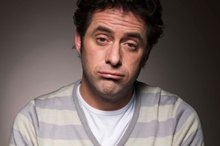Ritalin and Metabolism
Many children and adults suffer from attention deficit hyperactivity disorder (ADHD), which results in an impaired ability to concentrate and focus on basic tasks. Many patients with ADHD require the use of prescription stimulants to control their symptoms and improve concentration. The stimulatory nature of these medications may produce side effects that can include an increase in metabolism and weight loss. Unfortunately, this can cause some people to inappropriately use these drugs.
If you are experiencing serious medical symptoms, seek emergency treatment immediately.
ADHD
Patients who suffer from ADHD have an impaired ability to focus and concentrate. In addition, ADHD can include inappropriate behaviors and impulsivity. Symptoms of ADHD can affect the patient’s ability to function at school, work and in social environments. ADHD is a serious medical disorder that should be treated by a mental health professional and often requires treatment with prescription medications.
- Patients who suffer from ADHD have an impaired ability to focus and concentrate.
Methylphenidate
Drug Interaction Between Lithium and Caffeine
Learn More
Approved for the treatment of ADHD in children and adults, methylphenidate is a prescription stimulant that exerts a stimulatory effect in the central nervous system (CNS). Methylphenidate works by increasing the availability of the neurotransmitters norepinephrine and dopamine. Methylphenidate is available in both an immediate-release and extended-release formulation and marketed under various brand names, including Ritalin. Since all stimulants have the potential for addiction and abuse, methylphenidate is classified as a controlled substance by the Federal government.
- Approved for the treatment of ADHD in children and adults, methylphenidate is a prescription stimulant that exerts a stimulatory effect in the central nervous system (CNS).
Methylphenidate and Metabolism
Since the stimulatory effects of methylphenidate can affect other organ systems, patients using the drug may experience an increase in metabolism and energy consumption. Stimulants have also been known to increase blood pressure and heart rate. As a result, cardiac muscles increase their utilization of energy. Since stimulants also boost energy and alertness, patients using prescription methylphenidate may also be involved in more physical and mental activities throughout the day. The stimulatory affects of methylphenidate can widen the gap between energy expenditure and energy consumption, resulting in weight loss.
- Since the stimulatory effects of methylphenidate can affect other organ systems, patients using the drug may experience an increase in metabolism and energy consumption.
Methylphenidate Abuse
Side Effects of Fastin Diet Pills
Learn More
Although methylphenidate is approved only for the treatment of ADHD in adults and children, it has been abused for various reasons, including weight loss. Stimulant medications may also suppress appetite in addition to increasing metabolism. Unfortunately, excessive stimulatory activity can increase the risk of strokes, arrythmias, and heart attacks. Stimulants can also cause irritability, mood changes, aggression, anxiety and mental disorders. Since stimulants increase brain activity, uncontrolled electrical activity can lead to the development of life-threatening seizures. Prescription stimulants can exacerbate certain health conditions and interact with other medications, and patients should always speak with a physician before use.
- Although methylphenidate is approved only for the treatment of ADHD in adults and children, it has been abused for various reasons, including weight loss.
- Unfortunately, excessive stimulatory activity can increase the risk of strokes, arrythmias, and heart attacks.
Related Articles
References
- De Sousa A & Kalra G. Drug therapy of attention deficit hyperactivity disorder: current trends. Mens Sana Monogr. 2012 Jan-Dec;10(1):45-69.
- National Institute of Mental Health. Attention Deficit Hyperactivity Disorder-The Treatment of ADHD. Bethesda (MD): National Institute of Mental Health. National Institutes of Health. US Department of Health and Human Services. 2006.
- U.S. Food and Drug Administration. FDA Directs ADHD Drug Manufacturers to Notify Patients about Cardiovascular Adverse Events and Psychiatric Adverse Events. FDA News Release. Feb. 2007.
- Wigal SB. Efficacy and safety limitations of attention-deficit hyperactivity disorder pharmacotherapy in children and adults. CNS Drugs. 2009;23 Suppl 1:21-31.
Resources
Writer Bio
Jacob Seykans began writing online professionally in 2010. He has been a registered pharmacist for over five years. He has practiced pharmacy in both community and hospital settings. Seykans holds a Doctor of Pharmacy degree from the University of Minnesota.









